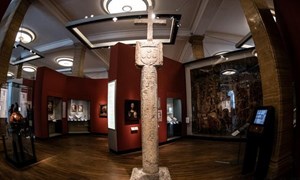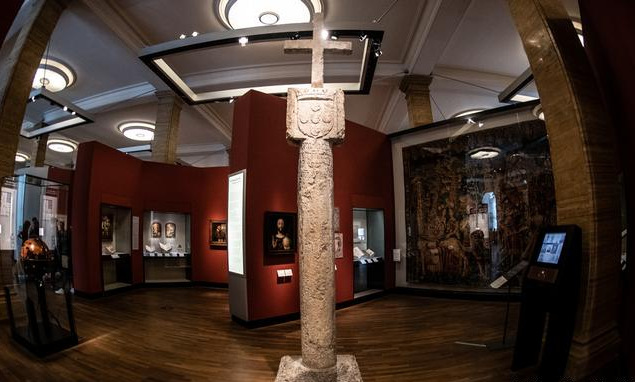
The country's culture ministers met to prepare a joint statement on how museums and institutions should deal with items acquired during the colonial era. A Cape Cross pillar is to be returned to Namibia.
Image: The pillar from Cape Cross is to be returned to Namibia, copyright picture-alliance, photo by P.Zinken
The country's culture ministers met to prepare a joint statement on how museums and institutions should deal with items acquired during the colonial era. A Cape Cross pillar is to be returned to Namibia.
Culture ministers from different German states and the federal level met on Wednesday to discuss a joint regulation of colonial items in the country's museums. "We want to deal responsibly with colonial-era collections, in close exchange with the countries concerned and the societies of origin," they declared in a joint statement.
Institutions housing such items will be called to play an important role to achieve this goal, also by carefully examining the history of their collections' pieces.

The pillar from Cape Cross is to be returned to Namibia, copyright picture-alliance, photo by P.Zinken
Carsten Brosda (SPD), Hamburg's Senator for Culture and the chairman of the conference of ministers of culture, called the meeting an important step towards developing a postcolonial concept of remembrance. "What was once appropriated through violence and coercion cannot be morally seen as something that was lawfully acquired," he said.
Monika Grütters, the federal government commissioner for culture and the media, said the process is part of Germany's historical responsibility for its colonial heritage. She emphasized that the dialogue with the countries and societies of origin should be founded on partnership and dignity.
Looted art to be presented online
Theresia Bauer, Baden-Württemberg's Minister of Science, Research and the Arts, described the online presentation of exhibits from colonial contexts as an important step towards making them globally accessible. The ultimate goal would be to show all exhibits in German museums online.
Bauer pointed out that considerable work still needs to be done to establish a critical culture of remembrance of Germany's colonial past. Cultural and educational institutions are to be tasked with raising public awareness on the topic. That also includes reappraising the way the colonial era is discussed in classrooms and textbooks.
Bauer also advocated involving the societies of origin in the restitution process, basing this on her state's experience with the return of the Bible and the whip of the former Nama leader Hendrik Witbooi (around 1830-1905) from the Linden Museum in Stuttgart in February. Witbooi's descendants were involved in the ceremony.
Ethics before law
Shortly before the ministers of culture met, the German Historical Museum (DHM) in Berlin announced that it was in favor of returning an object from Namibia on display in the museum, the "Pillar from Cape Cross."
Even though German and international law require no restitution claim, ethical and political reasons would argue for a return of the 15th century stone column, wrote Raphael Gross, president of the DHM Foundation, in an article for the Frankfurter Allgemeine Zeitung newspaper.
The museum's board of trustees hasn't yet agreed to the proposition, but that step is considered a matter of form.

ArtDependence Magazine is an international magazine covering all spheres of contemporary art, as well as modern and classical art.
ArtDependence features the latest art news, highlighting interviews with today’s most influential artists, galleries, curators, collectors, fair directors and individuals at the axis of the arts.
The magazine also covers series of articles and reviews on critical art events, new publications and other foremost happenings in the art world.
If you would like to submit events or editorial content to ArtDependence Magazine, please feel free to reach the magazine via the contact page.